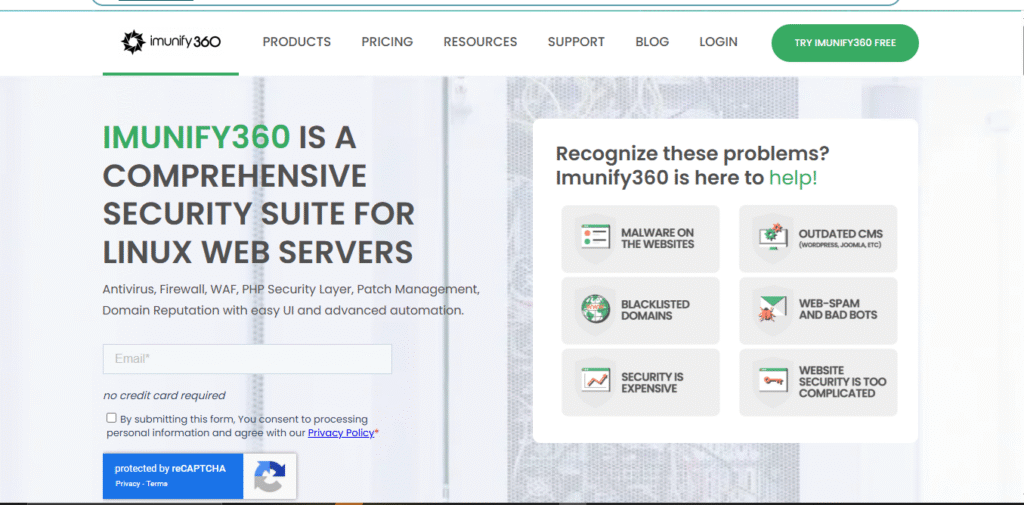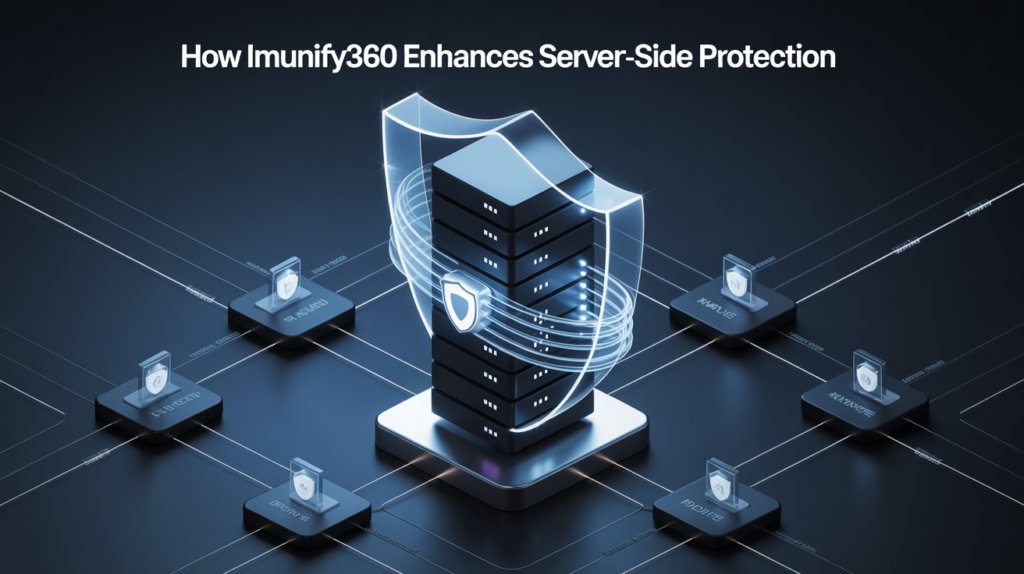Imunify360 is one such comprehensive security platform designed specifically for Linux web servers. Developed by CloudLinux, it provides a multi-layered defense system that enhances server-side protection by combining malware detection, firewall, intrusion prevention, and artificial intelligence. This integrated approach ensures that servers and their hosted applications are shielded from a broad spectrum of cyber threats, reducing downtime and increasing reliability. In this blog, we explore how Imunify360 works and why it is considered a powerful tool for modern server security.
In the constantly evolving world of cybersecurity, web hosting providers and server administrators face a growing number of threats that target server infrastructure and hosted websites. From malware and brute force attacks to zero-day vulnerabilities and complex web exploits, the security landscape demands robust, intelligent, and automated solutions.
Key Features of Imunify360
Imunify360 distinguishes itself through a rich set of features that work in unison to safeguard servers. Some of its core capabilities include:

- Real-time malware scanning and automatic cleanup
- A proactive firewall with advanced intrusion prevention
- AI-driven threat detection and behavior analysis
- Web Application Firewall (WAF) for blocking attacks on web apps
- Patch management to reduce vulnerabilities
- Reputation management and blacklist monitoring
- Centralized management dashboard with detailed reporting
Tip: Each of these features contributes to a comprehensive security posture that covers prevention, detection, and response.
Read Also: LAMP Stack and Why It Still Matters Today?
Real-Time Malware Detection and Removal
One of the most critical functions of Imunify360 is its ability to detect malware in real-time. Traditional security tools often rely on scheduled scans, which can leave a window of vulnerability. Imunify360, however, uses continuous scanning powered by advanced heuristics and signature-based detection.
When malware is identified, Imunify360 can automatically quarantine and remove the malicious files, preventing the spread of infection across the server or into client websites. This automated cleanup reduces the need for manual intervention, minimizing downtime and helping to maintain server performance and security.
Moreover, its malware database is regularly updated, ensuring it can detect even the newest threats.
Advanced Firewall and Intrusion Prevention System (IPS)
At the heart of server-side security is a robust firewall. Imunify360 integrates a next-generation firewall combined with an Intrusion Prevention System (IPS) to block malicious traffic before it reaches the server.

This firewall isn’t just a simple port blocker. It offers:
- Stateful packet inspection
- Layer 7 filtering (application layer)
- Protection against brute force attacks
- Detection and blocking of zero-day exploits
Additionally, Imunify360’s firewall is adaptive. It dynamically adjusts its rules based on ongoing threat intelligence and attack patterns, blocking IP addresses exhibiting suspicious behavior while allowing legitimate traffic through.
Proactive Defense Using Artificial Intelligence
What sets Imunify360 apart is its use of artificial intelligence (AI) to enhance security. The AI engine continuously analyzes server logs and traffic patterns to detect anomalies and new attack vectors that traditional signature-based methods might miss.
This behavior-based detection allows the system to proactively block emerging threats, such as novel malware strains or zero-day exploits, before they can cause damage. AI-driven automation also reduces false positives, ensuring minimal disruption to legitimate users.
By learning from global attack data gathered across thousands of servers, Imunify360’s AI constantly improves its ability to protect individual servers.
Web Application Protection and WAF Integration
Web applications are often the most vulnerable part of a server environment. Attackers frequently exploit weaknesses in CMS platforms like WordPress, Joomla, or Drupal to gain unauthorized access or inject malicious code.
https://en.wikipedia.org/wiki/Web_application_firewallImunify360 includes a powerful Web Application Firewall (WAF) that monitors and filters HTTP/HTTPS requests to block common web exploits, including:
- SQL Injection
- Cross-Site Scripting (XSS)
- Cross-Site Request Forgery (CSRF)
- Remote File Inclusion (RFI)
- Local File Inclusion (LFI)
This WAF operates at the application layer, providing granular control over traffic and ensuring that malicious payloads never reach vulnerable applications.
Patch Management and Vulnerability Scanning
Keeping server software up to date is fundamental to security. Many attacks succeed because servers run outdated software with known vulnerabilities.
Imunify360 simplifies patch management by scanning the server for outdated packages and vulnerable software components. It can automatically apply security patches to critical software like PHP, Apache, and MySQL, reducing the risk of exploitation.
This feature is especially valuable for hosting providers managing multiple servers or customers who may not have the expertise or resources to maintain up-to-date systems manually.
Reputation Management and Blacklist Monitoring
A server’s IP reputation is crucial, especially for email deliverability and SEO rankings. Compromised servers often end up blacklisted by email providers and security agencies, causing emails to bounce or sites to be flagged as unsafe.
Imunify360 includes tools to monitor the reputation of your server’s IP addresses and domains across various blacklists. It alerts administrators promptly if blacklisting occurs, helping to take swift remediation actions.
Maintaining a good reputation ensures smooth communication and preserves customer trust.
Automated Incident Response and Reporting
In the event of an attack or compromise, quick response and visibility are key to mitigating damage.
Here is the automated incident response by:
- Isolating infected files
- Blocking attacking IPs immediately
- Sending real-time notifications to administrators
Its detailed reporting dashboards provide insights into attack types, frequency, and sources. This transparency enables better forensic analysis and informed decision-making for future security strategies.
Ease of Integration with Hosting Environments
Imunify360 is designed to integrate seamlessly with popular web hosting control panels such as cPanel, Plesk, DirectAdmin, and CloudLinux OS.
This compatibility means that hosting providers and server admins can deploy and manage Imunify360 without major configuration changes or downtime. The intuitive interface allows even less experienced users to understand the security posture of their servers and take necessary actions.
Benefits of Using Imunify360 for Web Hosting Providers
Web hosting providers benefit significantly from deploying Imunify360, including:
- Reduced support tickets related to malware and hacks
- Improved customer satisfaction due to increased uptime and security
- Automated protection that scales across hundreds or thousands of servers
- Compliance with security standards such as PCI-DSS
- Differentiation in a competitive hosting market by offering superior security
By adopting Imunify360, providers enhance their service quality while reducing operational overhead.
Comparing Imunify360 with Other Server Security Solutions

While there are many security products available, Imunify360 stands out because it combines multiple security layers into one platform.
Unlike standalone antivirus or firewall solutions, Imunify360 offers an integrated approach that includes AI-driven detection, automated patching, and reputation monitoring. Its ease of use, seamless integration, and continuous updates make it a popular choice among hosting providers.
Compared to cloud-based security services, Imunify360 operates directly on the server, giving it faster response times and deeper insight into system-level threats.
Read Also: How Email Deliverability Affects Hosting Configuration
Best Practices for Configuring Imunify360
To maximize the benefits of Imunify360, consider these best practices:
- Start with default rules and gradually customize based on your server’s needs.
- Enable real-time malware scanning and automatic cleanup.
- Regularly review firewall logs and blocked IP addresses.
- Use patch management features to keep software updated.
- Monitor blacklist status frequently and address any alerts immediately.
- Train your support team on how to use the dashboards and alerts.
Following these practices ensures a robust defense without impacting legitimate traffic.
Case Studies: Real-World Impact of Imunify360
Numerous hosting providers have reported significant improvements in security after deploying Imunify360. For example:
- A mid-sized hosting company reduced malware-related customer complaints by 70% within the first six months.
- A managed WordPress host cuts downtime caused by brute force attacks by automating IP blocking and rate limiting.
- A reseller hosting provider achieved PCI-DSS compliance faster by leveraging Imunify360’s patch management and firewall capabilities.
Conclusion
In an era where cyber threats are both persistent and sophisticated, relying on piecemeal security measures is no longer sufficient. Imunify360 offers a comprehensive, intelligent, and automated server security solution that protects Linux servers from a wide range of attacks and vulnerabilities.
Its blend of real-time malware detection, advanced firewall, AI-driven threat analysis, and integrated patch management empowers server administrators and hosting providers to maintain secure, reliable, and performant environments.

